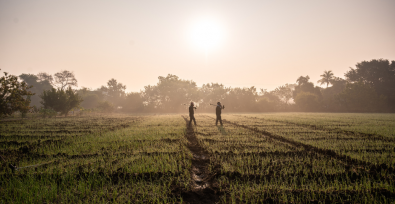NPR News relays the story of Shanta Bai, a farmworker in rural India, who was locked in a chicken coop for a week by her employer, along with other women, to ensure the loan she had received was repaid through her forced labor. Debt bondage is considered a type of forced labor because workers are often forced to work under exploitative terms and conditions, including violence, starvation, and in Shanta’s case, imprisonment in extremely inhumane conditions.
Repressive practices and unenforced laws lead to modern slavery
The practice of bonded labor in India dates back centuries and is held in place by what remains of caste hierarchy. The caste hierarchy was outlawed many years ago but tacitly still exists and prevents members of lower castes from being able to access education or find jobs that pay fair wages and are not exploitative. Bonded labor was also outlawed over 30 years ago, but it has not been effectively eliminated, especially in rural areas. According to the ILO, communities already marginalized by the caste system and living in poverty are particularly vulnerable to this form of modern slavery.
Jairam, Shanta’s husband, who was also held captive in a cow shed on the same property, said:
“All they fed us was a little rice and water, once a day, the place we were kept in was filthy. He also took away our phone so we couldn’t call for help.”
Jairam and Shanta were eventually freed by their son who paid off their debt by taking on a bonded labor agreement with another employer, sadly this practice of intergenerational debt bondage is also very common amongst the poor in India. However, since this type of labor has technically been outlawed, getting an actual number of how many are suffering under this type of forced labor is challenging. State police reported in 2021 a total of 2,235 cases of forced labor registered in India in 2021. Based on the anecdotal data gathered by the Centre of Indian Trade Unions, the unreported cases are significantly higher, perhaps even more than 1.1 million, and nearly 40% are women.
The vicious circle of debt bondage
Climate change is also increasing the number of people forced to enter debt bondage. When farmers’ harvests fail due to drought or flooding agricultural workers have few options other than to leave their homes and travel to any place they can earn a living. That often means agreeing to forced labor conditions and bonded labor.
Kamala Bai has spent almost 5 decades working in sugarcane factories and fields alongside workers like Shanta and Jairam.
Bai says:
“There is not one family here [in their community] who hasn’t experienced some form of exploitation, some were even forced to suicide to escape the cycle of debt they were stuck in,”
At 60 years old, Bai is a veteran of the debt bondage system, but she is also a leader in her community for change. Bai mobilized workers in her community to demand labor reform such as better wages and dignified treatment. Bai is working with other activists in the area, learning about her rights as a worker and regularly leading groups of farmworkers and women to protests at the local office of the government’s labor department. Freedom United applauds these grassroots actions and stands beside activist workers like Bai, rising to demand humane treatment and freedom from modern slavery, not just in India, but everywhere.







Freedom United is interested in hearing from our community and welcomes relevant, informed comments, advice, and insights that advance the conversation around our campaigns and advocacy. We value inclusivity and respect within our community. To be approved, your comments should be civil.